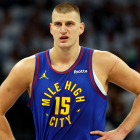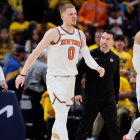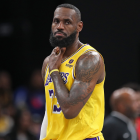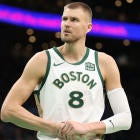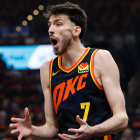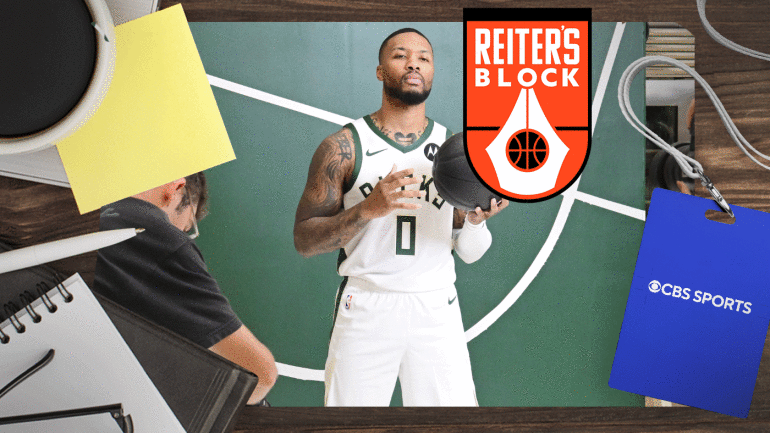
One acceptable way to assess last week's game of NBA musical chairs would be to look at which teams are, after the fallout from the Damian Lillard trade, best poised to compete right now.
For that, congratulations go to the Milwaukee Bucks and Boston Celtics, who got Lillard and Jrue Holiday, respectively, and the best odds to win it all this upcoming season. The Phoenix Suns, too, come in for some praise, having added much-needed depth.
Another perspective would be through the prism of the future, and so assessing the various assets taken in by the sellers in the bevy of moves that took place. In that view, to be sure, the Portland Trail Blazers wrung massive returns from moving Lillard, and then moving Holiday. Most across the league think Malcolm Brogdon will soon follow suit, further bolstering Portland's slew of future draft picks.
But perhaps the proper measurement for each of these teams should be based on the actual catalyst that drove each of these deals: The self-interest of each of the general managers and front-office personnel involved.
"You do have to view it through the lens of, 'How does it help the individual and not just the lens of how it helps the team,'" one NBA executive admitted. "It's, 'I'll expand my timeline under the cover of, 'It's best for the team.'"
That's a very understandable motivation, if in some ways an ugly one. It's human nature, after fall, to act to preserve yourself. Especially for NBA GMs who will be blamed, fair or not, if things go wrong. And immediate success -- a championship, say, in Milwaukee or Boston -- gives the organization what it wants and Jon Horst or Brad Stevens ample breathing room.
So self-interest and organizational interest can certainly overlap. There is, often, a healthy Venn diagram between what a GM needs to do for himself and what he needs to do for his team.
Here's a look at last week's action from that most important of vantage points, that of NBA decision makers' self-interest:
Trail Blazers, Joe Cronin: Cronin's primary goal here is not to be the next small-market GM who gets blamed for failing to succeed after losing a star player. In this, he's likely succeeded.
The Lillard trade has provided Portland with two unprotected first-round draft picks in 2029, first-round swaps in 2028 and 2030 and a top-four protected first-rounder from the Warriors next year. He could certainly add more if he moves any of the players who remain -- Deandre Ayton, Robert Williams III, Brogdon, and/or Toumani Camara.
It's an excellent, impressive return. He refused to blink and acquiesce to the idea that Miami was the only realistic buyer out there. But here's the other smart move Cronin pulled last week: He set up a long-term, Oklahoma City-style rebuild. And what does that require? … Time. Just the kind of time a GM needs to remain employed year after year.
It's a model Sam Presti has perfected. The Thunder GM is excellent, smart, celebrated -- and inevitably employed. Worth noting: While Presti has been largely serenaded by NBA media -- and his moves to build a young, talented roster mean he's earned most of those flowers -- his team hasn't won a playoff series since 2016.
A long rebuild done the right way, with signs of progress and well-executed trades, can equal long-term job stability. It's a fact not lost on those pulling off these moves.
Bucks, Jon Horst: There are two ways for Horst to succeed here: Win another NBA championship with Lillard now, or come close enough so that it convinces Giannis Antetokounmpo to stick around for years to come.
"I want to be a Milwaukee Buck for the rest of my career, as long as we are winning," he said Monday.
Everything hovers around this: Get the Greek Freak to sign on the dotted line for a massive extension in 2024, and then keep him happy enough so that he doesn't demand to go elsewhere somewhere down the line.
Otherwise, at the end of the decade, all those assets Milwuakee sent away will likely become the problem of someone other than Jon Horst.
Suns, James Jones: It's hard to read the tea leaves here for Jones, largely because it's hard to understand his place in the new power dynamic under new owner Mat Ishbia. What's certain is the Suns went all-in to bring in Kevin Durant and Bradley Beal, and they've moved on from a broken relationship with Ayton in exchange for much needed depth
Celtics, Brad Stevens: Stevens tapping Joe Mazzulla as the head coach has not been a universal success (yet) despite losing last year in Game 7 of the Eastern Conference finals under trying circumstances.
Several people across the NBA who talked to CBS Sports were most impressed by Boston's moves. The Celtics, several pointed out, moved on from Brogdon -- "a malcontent in Boston," one said -- upgraded offensively, swapped out Marcus Smart for Holiday, and still have ample future picks to use, if necessary.
But the pressure's on. Boston needs to make this new-look, much-more-offensive-minded team work to keep the heat off Mazzulla and -- if that firewall is breached -- Stevens himself.
Steve Ballmer's masterclass in management
The Clippers weren't mentioned in the previous section, in part because a source familiar with the inner workings of that organization made a fascinating point about team owner Steve Ballmer: That he's the rare type who will own his decisions and whims if and when they go wrong.
Most owners -- no shock here -- can have selective amnesia when things go sour.
And it was Ballmer, several have pointed out, who pushed aggressively for bringing in Kawhi Leonard and Paul George a few years ago. In PG's case, that meant sending Presti and the Thunder Shai Gilgeous-Alexander, a move that, in retrospect, looks a lot like a borderline disaster.
It's the same reason, to those monitoring these things, that a trade that lands James Harden in Los Angeles -- or anywhere else -- seems much less likely than the inevitable move that was Lillard leaving Portland.
First, Clippers president of basketball operations Lawrence Frank doesn't have to sweat the Kawhi-PG failure -- at least so far -- and his own job the way other, more successful GMs around the league do.
And that lack of desperation means the Clippers are less likely to panic. General managers act in their own self-interest, and the view for Frank and his front office is that Ballmer does not blame them for carrying out the very thing he asked them to do -- even if it's not working.
Harden? ... Harden? ... Harden?
So what of James Harden? He did not show up for camp this week on-time. He missed 76ers media day on Monday, was a no-show for the team's first practice on Tuesday, however, he is expected to arrive at their training camp in Colorado on Wednesday. This after his public lambasting of Daryl Morey over the summer. And, as in Milwaukee, the last thing Philly needs is for its star player, Joel Embiid, to grow disgruntled and decide he wants to be somewhere else.
But how is trading Harden for too little going to convince Embiid to stick around?
While it may not go this way, several of Morey's colleagues said they think the Sixers president of basketball operations could go this route: Refuse to trade Harden for anything less than a haul, hold onto the hope Embiid won't blame the organization for Harden's scorched-earth approach, and decide to gamble on an angry Harden over poor pieces that do too little.
"How is trading away all that equity to get James only to take a first-round pick in the 20s going to help Daryl succeed?" one source said. "I'd rather die on that hill with James still there.
"Remember, a motivated, in-shape James Harden is still more valuable than what's been talked about for him so far. This ain't Russell Westbrook at the end of his career. When motivated, he can still be a top 15 player. He averaged 21 and 11, and he hated his coach last year so much."
One sportsbook put the odds that Harden plays again for the Sixers at +150 and -200 that he does not.
An ESPN report says Harden plans to go to camp simply to make things as uncomfortable as possible to help force a trade. That'll be an interesting dynamic at odds with what many of Morey's colleagues believe is the right course of action for the Sixers -- to stand pat.
A word on Deandre, LeBron and Emo Jimmy
- "Turns out the problem with Deandre Ayton was Deandre Ayton," said one NBA league executive. "The problem in Phoenix was supposed to be, 'It's a Monty thing,' but it was an Ayton thing. It was the same story with this [new] coaching staff. So now he can walk around Portland with his max contract and act like he's a star in a way he couldn't in Phoenix."
- At 38, LeBron James is eight years older than Anthony Davis, the teammate nearest his age. He'll be 39 in December. For now, he's the game's oldest player -- as well as his team's most important. Were the Lakers to find themselves in the NBA Finals, and were LeBron to be that series' MVP, he'd pass Kareem Abdul-Jabbar as the oldest Finals MVP in NBA history.
- Long live Emo Jimmy and the haircut that sparked 10,000 memes, lightened the mood for a restless and frustrated Miami Heat organization, and reminded all of us that with great struggle -- losing out on Dame, watching your championship odds drop from 8-1 to 30-1 -- comes startling new hair styles.
















